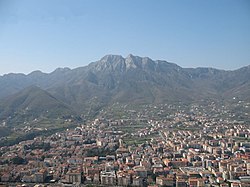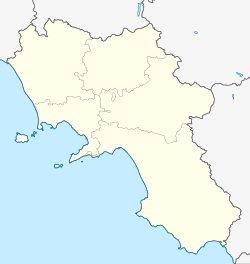| This article includes a list of general references, but it lacks sufficient corresponding inline citations. Please help to improve this article by introducing more precise citations. (March 2011) (Learn how and when to remove this message) |
You can help expand this article with text translated from the corresponding article in Italian. (January 2022) Click for important translation instructions.
|
| Cava de' Tirreni 'A Cava (Neapolitan) | |
|---|---|
| Comune | |
| Città di Cava de' Tirreni | |
 | |
 Flag Flag Coat of arms Coat of arms | |
 Cava within the Province of Salerno Cava within the Province of Salerno | |
| Location of Cava de' Tirreni | |
  | |
| Coordinates: 40°42′N 14°42′E / 40.700°N 14.700°E / 40.700; 14.700 | |
| Country | Italy |
| Region | Campania |
| Province | Salerno (SA) |
| Frazioni | see text |
| Government | |
| • Mayor | Vincenzo Servalli |
| Area | |
| • Total | 36.46 km (14.08 sq mi) |
| Elevation | 180 m (590 ft) |
| Population | |
| • Total | 50,346 |
| • Density | 1,400/km (3,600/sq mi) |
| Demonym | Cavesi |
| Time zone | UTC+1 (CET) |
| • Summer (DST) | UTC+2 (CEST) |
| Postal code | 84013 |
| Dialing code | 089 |
| Patron saint | Sant'Adiutore & Santa Maria Incoronata dell’Olmo |
| Saint day | September 8 |
| Website | Official website |
Cava de' Tirreni (Italian: [ˈkaːva de tirˈrɛːni]; Cilentan: A Càva) is a city and comune in the region of Campania, Italy, in the province of Salerno, 10 kilometres (6 miles) northwest of the town of Salerno. It lies in a richly cultivated valley surrounded by wooded hills, and is a popular tourist resort. The abbey of La Trinità della Cava is located there.
Geography

Overview
Cava de' Tirreni lies among the hills close to the Tyrrhenian Sea, 5 km (3 mi) north of the Amalfi Coast and serving in practice as its northern gateway. The inhabited area is 198 m above sea level, in a valley situated between two mountain groups: the Lattari Mountains (which separate Cava from the Amalfi Coast) to the west and the Picentini Mountains to the east. Many of Cava's citizens reside in the hills surrounding the town.
Cava is bordered to the north by Nocera Superiore, Roccapiemonte and Mercato San Severino; to the east by Baronissi, Pellezzano and Salerno; to the south by Vietri sul Mare and Maiori; and to the west by Tramonti. The town is a link between the geographical area of Agro Nocerino Sarnese (flat, with an agricultural and industrial economy) and the Sorrento Peninsula (mountainous, with an economy based on tourism).
Frazioni
The Italian: frazioni of Cava are: Alessia, Annunziata, Arcara, Casaburi-Rotolo, Castagneto, Corpo di Cava, Croce, Dupino, Marini, Passiano, Pregiato, San Cesareo, San Pietro, Sant'Anna, Sant'Arcangelo, San Martino, Santa Lucia, Santa Maria del Rovo, Santi Quaranta.
History
The town, initially comprehending present-day Vietri sul Mare, was founded by the Etruscans with the name of Marcina, as part of a colonial system known as Etruria Campana. The modern name Cava de' Tirreni (lit. 'Cave of the Tyrrhenians') is a tribute to the Etruscan heritage of the area. The church and the greater part of the abbey buildings were entirely modernized in 1796. The old Gothic cloisters are preserved. The church contains a fine organ and several ancient sarcophagi. The archives, now national property, include fine incunabula, documents and manuscripts of great value (including the Codex Legum Longobardorum of 1004 and the La Cava Bible).
Main sights

| This section does not cite any sources. Please help improve this section by adding citations to reliable sources. Unsourced material may be challenged and removed. (March 2021) (Learn how and when to remove this message) |
- Abbey of La Trinità della Cava, founded in 1011. Features include the ambon with mosaics (12th century), the grotto of St. Alferius, the Romanesque cloister (13th century) and the large library, housing more than 50,000 volumes.
- Cathedral (Duomo), begun in 1517 and opened in 1571.
- Sanctuary of St. Francis and St. Anthony, an early 16th-century structure restored after the 1980 earthquake had damaged it. The façade is in tuff and travertine, with three large arches, the central one surmounted by a balcony. The main portal has a series of friezes sculpted in 1528 by local masters and containing scenes from the Gospels. The belltower, with three orders, was finished in 1584. The interior is on the Latin Cross plan, with some 16th-century frescoes by Belisario Corenzio in the sacristy.
Personalities
- Lucia Apicella (Mamma Lucia, philanthropist)
- Ferrante I d'Aragona (Ferdinand I of Naples, King of Naples from 1458 to 1494)
- Mario Avagliano (historian and journalist)
- Tommaso Avagliano (writer and publisher)
- Ferdinando Baldi (film director, film producer and screenwriter)
- Alfonso Balzico (sculptor and painter)
- Luca Bisogno (footballer)
- Pope Boniface IX
- Alda Borelli, actress in theatre and silent films
- Donato Antonio Cafaro (16th century engineer)
- Donato Antonio Cafaro (17th century royal engineer, probably descended from the previous)
- Giambattista Castaldo (16th century soldier)
- Giuliana De Sio (actress)
- Teresa De Sio (singer)
- Giovanni Vincenzo Della Monica (16th century engineer; collaborated with Giovan Battista Cavagna)
- Raffaele Della Monica (cartoonist)
- Antonietta Di Martino (high jumper, Italian indoor/outdoor champion)
- Antonio Fiorentino della Cava (architect, designer of the cloisters of Santa Caterina a Formiello)
- Giulio Genoino (Catholic priest; originator, with Masaniello, of the Neapolitan Revolt of 1647)
- Costantino Grimaldi (philosopher, jurist, politician and noted anticurialist)
- Simonetta Lamberti (10-year-old victim of a Camorra killing)
- Sabato Martelli Castaldi (General of the Italian Air Force, partisan and martyr killed in the slaughter of the Fosse Ardeatine massacre on 24 March 1944; posthumous Gold Medal of Military Valor)
- Attilio Mellone (member of the Franciscan order and man of letters)
- Eduardo Migliaccio (actor and comedian)
- Gino Palumbo (journalist)
- Giampaolo Parisi (football player)
- Andrea Rispoli (football player)
- Fausto Salsano (football manager)
- Raffaele Schiavi (football player)
- Stefano Sorrentino (football player)
- Federico Pisapia, Marco Senatore, Vincenzo Schiavo, Giuseppe Schiavo (First FLAGS artists in Cirque du Soliel 2011)
Twin towns – sister cities
Cava de' Tirreni is twinned with:
 Gorzów Wielkopolski, Poland
Gorzów Wielkopolski, Poland Kaunas, Lithuania
Kaunas, Lithuania Pittsfield, USA
Pittsfield, USA Schwerte, Germany
Schwerte, Germany Nesvizh, Belarus
Nesvizh, Belarus Tbilisi, Georgia
Tbilisi, Georgia
See also
References
- "Superficie di Comuni Province e Regioni italiane al 9 ottobre 2011". Italian National Institute of Statistics. Retrieved 16 March 2019.
- "Popolazione Residente al 1° Gennaio 2018". Italian National Institute of Statistics. Retrieved 16 March 2019.
- ^
 One or more of the preceding sentences incorporates text from a publication now in the public domain: Chisholm, Hugh, ed. (1911). "Cava dei Tirreni". Encyclopædia Britannica. Vol. 5 (11th ed.). Cambridge University Press. p. 560.
One or more of the preceding sentences incorporates text from a publication now in the public domain: Chisholm, Hugh, ed. (1911). "Cava dei Tirreni". Encyclopædia Britannica. Vol. 5 (11th ed.). Cambridge University Press. p. 560.
- "Statuto Comunale" (PDF). Città di Cava de' Tirreni (in Italian). 30 May 2019. p. 2. Retrieved 8 August 2021.
External links
- Tuttosucava.it – All about Cava (click on union flag to see English translation)
- Local Tourist Office of Cava de' Tirreni (English version)
- CampaniaMeteo: weather report and forecast (in Italian)
- Archidiocese of Amalfi-Cava de' Tirreni (in Italian)
- Photos of Cava de' Tirreni (in Italian)